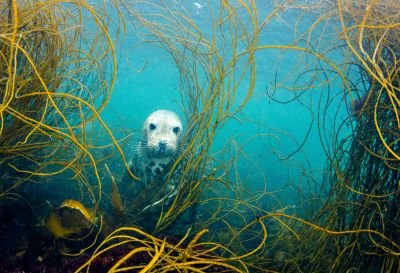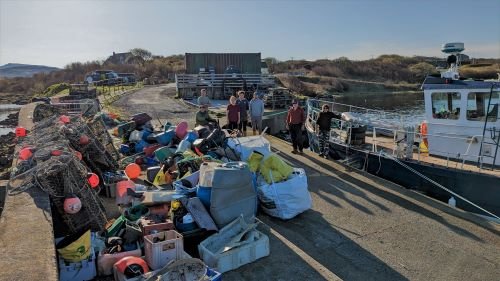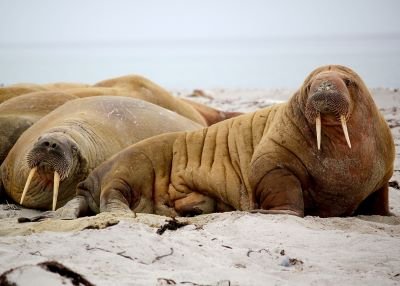
Positive Ocean News: May edition
We've rounded up some of the positive news stories for our ocean from May, including a major litter clean-up, the success of artificial rockpools and the reintroduction of an endangered fish.
Critically-endangered fish to be reintroduced to UK waters

Credit: Egor Kamelev
Decades after the native sturgeon fish was almost wiped out from the UK, conservationists have developed a strategy and action plan to recover the fish populations of both the European and Atlantic species.
The giant armour-plated fish, which grow up to 5m in length, start off in rivers, before migrating to seas and coastal waters where they spend the remainder of their 60-year-long lives.
Once numbers of sturgeon fish have increased in the UK, the Zoological Society of London, which devised the action plan, will set out to identify vital habitats, restore migratory passages for the fish to travel out to sea, and prevent them being caught by fishers.
Read the full article on the Good News Network website
Ocean Census sets out to identify 100,000 new marine species in 10 years
Ocean Census aims to use new technologies and methods to discover species, as the rate for species discovery is currently 2,000 per year – similar to that of the 1800s.
As part of the initiative, scientists around the world will explore biodiversity hotspots to find yet-unknown species and the data will be freely accessible to scientists, decision makers and the public across the globe.
Oliver Steeds, Ocean Census director, explained that “We can’t protect what we don’t know exists”, adding “…we hope the giant leaps in knowledge we can make with the discovery of ocean life, can help put us on a better track towards a positive future for people and the planet.”
Read more on the Oceanographic Magazine website
10 tonnes of beach litter removed in major clean-up
The beach cleans took place over two consecutive weekends, during which an estimated 10 tonnes of beach litter was removed.
The litter collected from the beaches was removed by boat, where is it recycled as much as possible, with almost two tonnes sent to Ocean Plastic Pots which uses fishing nets and rope to make plant pots.
The team spent three days cleaning one beach on which it was impossible to see the ground due to the amount of fishing nets, rope, oil drums and plastic pieces present.
Kerrie Flockhart, the project co-ordinator and Sea Champion for the Marine Conservation Society, says that the team has plans to return to the bay over summer to try and remove the deep layer of tangled nets and ropes covering a large section of it. She added, “We hope to get this beautiful bay back to how it should be.”
Read more on The National website
Artificial rockpools attract variety of marine life

Credit: Prasanth Kv/Unsplash
Following the creation of 114 manmade rockpools in Bournemouth and the Isle of Wight, scientists have discovered that they have successfully attracted marine species such as molluscs, crabs, small fish and seaweed.
The researchers from Bournemouth University installed the rockpools in 2020 and have since been monitoring their use. They recorded 65 species among 45 of the rockpools at Sandbanks, including a protected native oyster.
It is hoped that the discovery will encourage more artificial rockpools to be installed in future to act as a haven for vulnerable marine life in urban coastal spaces.
Read more on the Guardian website
Plastic pollution could be cut by 80% by 2040
The changes required to achieve this include eliminating unnecessary plastics like excessive packaging, replacing plastic with more environmentally-friendly alternatives, and increasing recycling and plastic reuse.
The new report estimates that plastic pollution could be reduced by almost a third (30%) through increasing reuse of plastics, with measures such deposit-return schemes for containers. Increasing recycling could reduce it by 20%, and replacing plastic with greener alternatives could cut it by a further 17%.
As well as the steps which would need to be taken, the report highlights the funding and support required, and the benefits of doing so.
Read more on the Guardian website
Record number of olive ridley turtles nesting in Bangladesh

Credit: Abigail Parker
The number of eggs laid by olive ridley turtles on Bangladesh’s beaches has increased by 30% since 2022, with 7,528 recorded across 58 sites.
The increase follows conservation efforts by the government, NGOs and local communities.
Five conservation sites have been established which incubate the eggs and allow them to be hatched in a controlled and safe environment – giving the hatchlings the best chance of survival. Nesting grounds have been set up across beaches to help females to lay their eggs safely, and local communities have been educated about the importance of safe environments for turtles.
Read more on the Mongabay website
UK to ban imports of ivory from walruses, sharks and orcas
But now, ministers have decided to close that loophole by extending the ban to include ivory from all animals, protecting an additional five vulnerable species from being targeted.
It is hoped that the move will help to conserve and safeguard these endangered species, with sharks, orcas, walruses, narwhals and hippos already under threat due to climate change.
Read more on the Guardian website
Seals making a comeback in Belgium

Credit: Cathy Lewis
After almost entirely disappearing from Belgium’s coast at the end of the last century, seals are now making a comeback.
Over the past 20 years, numbers have been steadily rising, and now it's estimated that 100-200 seals now live on Belgium’s beaches.
Following COVID-19 restrictions, seals began increasingly visiting the then-quiet beaches. But as people returned to the Belgian shores, ‘seal-only’ zones were established to help protect the animals from being disturbed by humans.
Volunteers now patrol the areas to ensure that the seals and humans can enjoy the beach separately, and peacefully.
The Sea Life Centre, which takes care of injured seals, and a ban on gillnet or trammel net fishing, which harms and kills seals accidentally caught, has also contributed to the rise in the Belgian seal population.
Read more on the Euro News website





